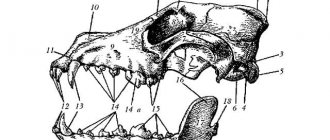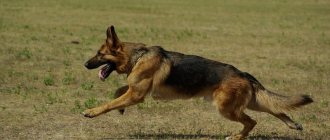General rules
Before vaccinating your German Shepherd puppy, you should become as familiar as possible with the rules and recommendations provided by your veterinarian.
The most important rule: vaccination is under no circumstances prescribed to a sick dog. Even general malaise is an important indicator that it is better to postpone the injection. Therefore, a few weeks before an important event, monitor your pet, take its temperature and pay attention to any changes in its behavior.
Since vaccination is not a therapeutic process, but the introduction of weakened viruses into the body to develop immunity, it can kill sick German Shepherd puppies. Or an unhealthy pet who receives an injection may become seriously ill or remain crippled.
When choosing a vaccination for your shepherd, be sure to consult a veterinarian. No reading forums or advice from experienced dog lovers. Such injections are no joke, so it is the doctor who will tell you how and when to vaccinate. It also happens that the injection scheme that suits an experienced shepherd owner may not work in your case. Therefore, everything here is decided in personal consultation with a veterinarian.
It is very important to follow the vaccination schedule, because if you vaccinate your dog ahead of schedule, the vaccine may not work.
Preparation
The first vaccination for a puppy is always stressful for the owner, since there will be a lot of work involved. Get as much information as possible from the breeder about how he fed the puppy - before vaccination, you will need to accurately copy the diet for your pet. After vaccination, you will have to feed the baby for 14 days according to the scheme proposed by the breeder - after which you can transfer him to your feeding system.
Seven days before the procedure, you will need to give your pet an anthelmintic to drive out the helminths - such a drug can be purchased at any veterinary pharmacy. You can even use baby suspension - it won't harm your dog.
Vaccinations for puppies are always a serious shake-up for the body. After all, during the vaccination process, a weakened virus enters the body - an internal resource must be developed there in order to defeat the infection and learn to fight it. That is, in fact, a mild infection occurs - it is not surprising that the dog should be absolutely healthy at this moment.
Before vaccinating German Shepherd puppies, you need to carefully monitor them. If you see that your pet eats with appetite, is cheerful, active and sleeps well, you can invite a doctor for vaccination. It is better to avoid visiting a veterinary clinic - there your dog may become infected with an infection even before he is vaccinated.
To avoid various kinds of complications, take special measures:
- It is best to vaccinate a German Shepherd puppy in the morning on an empty stomach;
- Before the procedure, take his temperature - it should not be higher than 38.50C. The measurement is performed with an ordinary thermometer in the dog's anus;
- Start giving your baby an antihistamine a couple of days before;
- On the day of vaccination, your pet will need a diet, no additional stress, and enough drinking water.
Preparation and Precautions
The first vaccination is very important. And you need to be well prepared for such a procedure. First, adjust the puppy’s diet - it should be familiar to him, nothing new.
A week before such an important event, your German Shepherd puppy should be checked for helminths and given a special drug against these parasites. Next, you should monitor your pet. If he is cheerful, active, eats well, you can go for an injection. But it is better that the German Shepherd is vaccinated at home, since various infections can be picked up at the veterinary clinic.
Similar article: Weight and height of a German Shepherd puppy by month
If your “baby” is lethargic and does not want to eat, then they refuse vaccination for a while. In this case, the puppy should be shown to a doctor.
When to get vaccinated? It's best in the morning, on an empty stomach. Before this, the pet’s temperature is taken, and two days later he can be given antihistamines. On the day of the injection, you need to provide your pet with complete rest and plenty of fluids.
We recommend this article:
On what day after deworming should a dog be vaccinated?
What vaccines are there?
It is important not only what vaccinations need to be given, but also what medicine is used for this. It is quite obvious that timely vaccination of a pet is the only way to protect it from a number of diseases.
Veterinary clinics often have their own dog vaccination schedules and choose different medications. The owner of a shepherd simply needs to ask in detail the veterinarian to whom he takes the animal.
Typically, one vaccine strengthens an animal's body against one disease by stimulating it with a non-contagious virus. Chemically altered microorganisms will not be able to provoke the development of the disease.
Types of vaccines:
- Polyvalent - one injection is aimed against many diseases.
- Monovalent - with one injection against one disease.
Monovalent medications are best for German Shepherd puppies because they focus on specific diseases. But several procedures in a row are a certain stress for a small animal. Therefore, there is nothing wrong with polyvalent serum, although veterinarians admit that the effectiveness will be slightly less.
First vaccination
The first vaccination should be given at the age of two weeks. Very often it is carried out by breeders if they have not yet purchased a puppy. In this case, the date of the injection and all documents for the vaccine must be in the dog’s veterinary passport.
If you will be giving the first injections, then take this very seriously. Since new owners and moving to someone else’s home are already stressful for a pet, it needs to be vaccinated at least a week after it has settled with you.
After the injection, the pet should not be taken outside; it should be protected from contact with other animals. There is no need to bathe on this day, touch the injection site, change food or agitate the puppy. Two to three weeks are the most dangerous, as immunity begins to develop, and the dog can get sick.
Where is the best place to get vaccinated?
Of course, at home - to avoid contact with sick animals that are brought to the clinic. If possible, arrange to call a veterinary specialist to your home or do it yourself. However, if you vaccinate yourself, most likely, the clinic will refuse to put the appropriate marks in the veterinary passport, and this is extremely necessary for passing veterinary control at exhibitions, customs, etc.
After vaccination, the dog should not be bathed or overtired. Contact with other dogs should be limited.
Although licensed vaccines have a high safety profile, there is no one product that can be guaranteed to be safe for all patients, and there are isolated cases of adverse reactions from the vaccine ranging from fever and lethargy to allergic and autoimmune diseases and death of animals.
What vaccinations does a dog need?
What vaccinations do German Shepherd puppies get? There are several of them, and they are all very important. There are a number of mandatory injections that are administered during certain months of a dog’s life. But there are also those that are recommended for dog lovers. Whether to introduce them or not is up to the dog owner and the veterinarian to decide. German Shepherd puppies must be vaccinated against the following diseases:
- infectious hepatitis;
- parvovirus infection;
- arboviral enteritis;
- plague;
- rabies;
- leptospirosis;
- parainfluenza
Related article: Symptoms and treatment of German Shepherd diseases
Vaccines are administered according to doctor's recommendations and schedule. This allows you not only to build your pet’s immunity, but also to protect it from dangers. If you deviate from the table, the administration of injections is controlled by a doctor.
What diseases should you be vaccinated against?
In order for a shepherd puppy to be healthy, vaccination against the following diseases is necessary:
- rabies;
- leptospirosis;
- adenovirus;
- infectious hepatitis;
- parvovirus ethitis;
- plague.
Important! Vaccination against rabies is mandatory. This is an incurable disease with a fatal outcome, and poses a threat not only to the pet, but also to people.
Plague
Plague is a contagious disease transmitted by airborne droplets. There are several forms of the disease:
- Intestinal-pulmonary, with damage to the relevant organs. In this case, symptoms of diarrhea, vomiting, and blurred eyes are typical.
- Skin. Symptoms include liquid blisters on the body.
- Nervous. It manifests itself in the form of involuntary urination, difficulty breathing and failure of the functioning of the limbs.
It is treated in a veterinary clinic using the following drugs (depending on the form of plague):
- hyperimmune serum;
- antimicrobial agents;
- antiviral drugs.
Expert opinion
Anna Abramenko
An avid dog lover. Experience in veterinary medicine since 2009.
Ask a Question
To eliminate the risk of disease, German Shepherd puppies are vaccinated at the age of 8 to 10 weeks. Re-vaccination is done after the replacement of baby teeth, usually around 6 months.
Parvovirus ethitis
This is a disease of a dog's small intestine that can be fatal. The virus is transmitted from infected animals. Able to persist on various objects for several months. German Shepherd puppies up to six months of age are most vulnerable. The disease is diagnosed by analyzing stool and the level of white blood cells in the blood. Characteristic symptoms:
- rapid pulse;
- refusal to eat;
- bloody diarrhea;
- vomit;
- stomach ache.
Expert opinion
Anna Abramenko
An avid dog lover. Experience in veterinary medicine since 2009.
Ask a Question
It is treated by administering intravenous solutions or blood transfusions. To eliminate the risk of infection, Eurikan or Nobivak vaccines are used.
Infectious hepatitis
A disease associated with inflammation of the liver. Affects the gallbladder, ducts and gastrointestinal tract. Symptoms appear as:
- increase in liver size;
- changes in the color of mucous membranes and skin;
- diarrhea;
- darkening the color of urine;
- increase in body temperature;
- decreased appetite;
- blurred eyes.
The disease spreads through contact with sick animals or contaminated objects. For diagnosis, a biochemical analysis of blood and urine is used. It is treated using the following means:
- antibiotics;
- antitoxic drugs;
- painkillers;
- diuretics;
- hepatoprotectors.
Adenovirus
This is an acute respiratory disease. Affects the mucous membrane of the eyes and intestines. Does not pose a danger to people. Transmitted through direct contact between animals. Symptoms:
- increase in body temperature up to 40 degrees;
- purulent discharge from the eyes;
- cough;
- lack of appetite;
- weakness.
Adenovirus is diagnosed by performing a blood test. There are various treatment methods using the following medications:
- Immunostimulants - to strengthen the body's immunity.
- Enzyme agents - to improve the functioning of the digestive tract.
- Antihistamines - to eliminate respiratory abnormalities.
- Adsorbent - for mucous surfaces.
- Antitoxic - for the purpose of eliminating toxins.
- Hepatoprotectors - to restore the liver.
- Antibiotics - to exclude inflammatory processes.
Expert opinion
Anna Abramenko
An avid dog lover. Experience in veterinary medicine since 2009.
Ask a Question
After treatment procedures, an X-ray examination of the lungs is recommended.
Leptospirosis
An infectious disease transmitted by rats or wild animals. Features of the course:
- frequent urination;
- blood in urine;
- jaundice;
- temperature increase;
- fever;
- refusal of food;
- vomit.
Expert opinion
Anna Abramenko
An avid dog lover. Experience in veterinary medicine since 2009.
Ask a Question
Leptospirosis is diagnosed through urine and blood tests. It is treated with the use of hyperimmune drugs, antibiotics, streptomycin, antispasmodics and hemostatic drugs.
Important! A dog with leptospirosis can infect people and animals. If signs of illness appear, you must contact a veterinary clinic for examination.
Rabies
A fatal disease with no cure. Affects the nervous system. Transmitted by a bite from wild animals.
At the first stage, the animal begins to salivate profusely. The second stage of the disease is characterized by aggression and paralysis of the ligaments and tongue. At the third stage, the limbs become immobilized and general paralysis occurs, followed by the death of the animal. The only way to protect your pet from this terrible disease is timely vaccination. Vaccination against rabies is carried out in a veterinary clinic with the appropriate license.
Vaccination schedule
The table for administering the vaccine is a strict document that will help you properly care for your pet. Depending on how the dog feels, whether it is sick or not, the schedule may change. All measures taken are recorded in the animal’s passport.
The first vaccination is administered in the second to sixth week of the pet’s life. Then it is repeated at 8, 12, 16 weeks. Often it is done in the place where the animal was born. But there are also cases when the new owner should take care of this.
Now let’s look in detail at what age and what vaccines should be administered:
- The vaccine against coronavirus and parvovirus enteritis is administered over a period of 2–2.5 months. Deworming should be done two weeks before. Up to a year, the pet is vaccinated three times according to the schedule prescribed by the veterinarian. Then the injections are repeated annually.
- The distemper vaccine is administered at 2.5 months. Prescribing it later may be risky. At 7–8 months the vaccination is repeated, then it is given once a year.
- Rabies vaccinations are given after 8 months, if you already have a distemper injection. Such vaccines are administered in specialized clinics with the appropriate license.
- Antihelminthic therapy is carried out on the 21st day of the dog’s life with the Pirantel suspension. Next, the dogs are prescribed repeated deworming at one and a half months with Pirantel tablets. After this, the drug is given twice a year at the same time as the dog sheds.
- The vaccine against adenovirosis and leptospirosis is administered after four months of the pet’s life.
The vaccine should not be administered to pets during the period of changing baby teeth, as they are very weak. In this case, serious health problems and other problems are possible. Veterinarians recommend waiting with injections and giving them when the animal feels as good as possible.
We recommend this article:
What you need to know about the timing and preparations for vaccinating dogs
Veterinarians may recommend optional vaccines against other equally dangerous diseases; whether to administer drugs or not is up to you.
What vaccinations does a “German” puppy need?
The first year of a small pet’s life is an important stage in the development of a dog. It is during this period that the foundations of a pet’s health are laid. It is important not only to properly vaccinate within a predetermined time frame, but also to properly prepare your pet for a trip to the veterinary clinic.
The owner of the “German” should take care of:
- preliminary deworming (this will help avoid poisoning the animal’s body);
- pet’s health (on the day of vaccination, you should monitor the dog’s well-being; it should not be lethargic, have signs of illness, soft stools or elevated body temperature);
- development of an allergic reaction (it is recommended to give the animal an antihistamine several hours before the vaccine is administered).
Important! After vaccination, the dog needs to be provided with comfortable conditions, fresh drinking water in an accessible place and constant monitoring of its condition.
Typically, German Shepherds tolerate any vaccination well, but exceptions do occur. Your pet may experience an allergic reaction or side effects from the vaccine and require immediate medical attention.
Age at which vaccinations begin
Experts note that the puppy is in excellent health and is immune to viruses and diseases while feeding on its mother’s milk. Along with food, antibodies that are resistant to harmful viruses enter the baby’s blood.
The start of vaccination is considered to be 8–10 weeks of a pet’s life. During this period, the puppy ceases to be saturated only with mother's milk and switches to a natural, balanced diet. It is extremely important for him to receive support in the form of strong medications that build immunity against the most dangerous pathologies.
There are a number of vaccinations that need to be given in the first year of a German Shepherd puppy's life:
- at 2 months - a comprehensive vaccine against hepatitis, parvovirus enteritis, coronavirus enteritis and viral distemper;
- after 14–21 days, revaccination is carried out;
- at 6 months (after changing baby teeth) - a complex vaccine against leptospirosis, distemper and adenovirus;
- at 8 – 9 months – rabies vaccination.
It is very important to get all the necessary injections and follow all the recommendations of the veterinarian. This is the only way to be sure of your dog’s stable immunity to deadly viruses.
Advantages and disadvantages
When deciding to vaccinate German Shepherd dogs, the owner must understand that he is saving the pet’s life. After all, without a vaccine, many small dogs die.
Similar article: Rules for raising and training a German Shepherd
At the moment, there are many clinics that provide vaccination services. Professional veterinarians provide clear advice and monitor the dogs. Protected pets are not afraid of dangerous diseases, and their immunity will be stronger.
It is such comprehensive measures that are aimed at monitoring the health of the animal and stopping the spread of dangerous diseases that can even harm people.
We recommend this article:
Instructions for use of the Multikan-6 vaccine for dogs
Of course, there is always a risk for puppies. There are cases of complications, but with proper examination of the pet and compliance with all rules, these risks can be easily minimized. It is the vaccine that effectively prevents diseases. Therefore, you should think about it for your dog, and administer such drugs correctly, observing all the conditions.
Where can I get my first vaccination?
The puppy's vaccinations can be given by the breeder or veterinarian. If the breeder does it himself, then he must indicate all the data in the documents: the drug sticker, the date of administration.
- The vaccination schedule will help you not to miss time and will ensure control over your pet’s health. When the time comes for the next vaccinated person, the owner can vaccinate himself.
Now it has become possible not to take your pet to the clinic, but simply call a veterinarian at home. The animal will not come into contact with sick four-legged animals. The only thing is that the service will not be cheap; the specialist will have to come to your home and also take everything necessary with him, which will require quite a bit of payment.
The best option is to find a clinic in your neighborhood that you can quickly get to. Visit her regularly and choose a specific doctor. Many centers have a cumulative discount system that will help you save money.
Video “Veterinarians on vaccination of puppies”
In this video, your veterinarian will share tips for vaccinating puppies.
Recommended Posts
Standard height and weight of the Cane Corso breed by month
Weight of a puppy and an adult Labrador by month
Weight and height of a German Shepherd puppy by month
38 best dog breeds for apartments according to reviews from breeders and owners
Description and content of the hunting border terrier
TOP 40 best hunting dog breeds with names, descriptions and photos
What vaccinations does a German Shepherd need?
In Russia, a German shepherd cannot do without a rabies vaccination. The virus poses a danger not only to animals, but also to people. Unvaccinated dogs:
- they refuse foster care and treatment in some veterinary clinics;
- prohibited from participating in exhibition events;
- are not allowed to cross the border.
In addition to rabies, it is recommended to vaccinate your pet against:
- Leptospirosis. Another disease that poses a danger to humans. The virus is carried by wild animals and small rodents.
- Distemper of carnivores (distemper). This disease spreads rapidly and affects the nervous system, causing paralysis and cardiac arrest. A distemper vaccination given to a German Shepherd puppy will eliminate infection or, in extreme cases, will alleviate the course of the disease.
- Viral hepatitis. In puppyhood, the disease occurs in an acute form and often causes death.
- Parvovirus enteritis. The main symptoms of this disease include profuse diarrhea and vomiting, leading to rapid dehydration and exhaustion of the body.
The procedure for vaccination of German Shepherd puppies is determined by a veterinarian and depends on:
- breed characteristics;
- place of residence;
- outbreaks of epidemics;
- conditions of detention.
The following may be added to the list of diseases:
- lichen;
- parainfluenza;
- adenovirus;
- coronavirus enteritis;
- piraplasmosis;
- Lyme disease.











